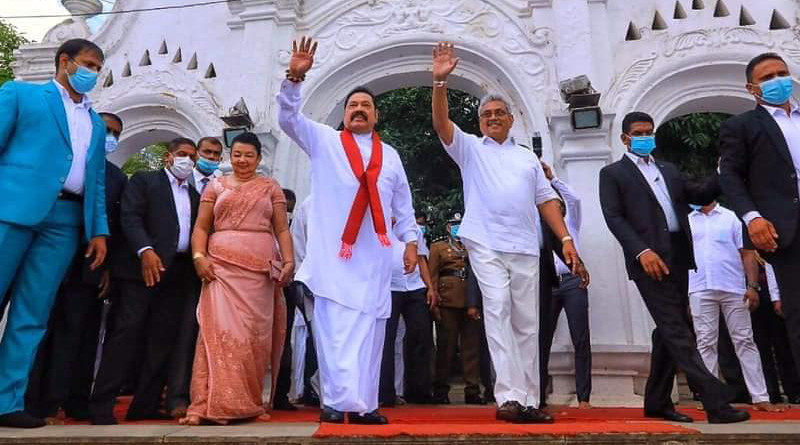Sri Lanka’s 2020 Parliamentary Election Results – Analysis
By IPCS
By Dr. Sripathi Narayanan*
The Sri Lanka Podujana Peramuna (SLPP)-led alliance secured 151 of 225 seats in Sri Lanka’s August 2020 parliamentary polls. With this victory, former President, Mahinda Rajapaksa (MR), has returned to power, and was sworn in as the prime minister on 9 August. With his brother and one-time Defence Secretary, Gotabaya Rajapaksa (GR), already elected as president in November 2020, the Rajapaksas are set to lead the country for the foreseeable future. This commentary contextualises the factors likely to shape this administration.
Past Baggage
The Rajapaksas’ twin-defeat in the 2015 presidential and parliamentary polls despite their incumbency was largely attributed to allegations about Sri Lanka—a multi-religious, multi-linguistic and multi-ethnic country—becoming a ‘security state’ riding on majority Sinhala/Sinhala-Buddhist chauvinism under their rule. The previous Rajapaksa administration also spent considerable time defending Colombo at the UN Human Rights Commission (UNHRC) over allegations of large-scale war crimes in the final stages of the war to eliminate the Liberation Tigers of Tamil Eeelam (LTTE). Sri Lanka’s weaning away from traditional partners such as India or others in the West, and into China’s sphere of influence, is also attributed to MR’s two-term presidency (2005-15). In this regard, Sri Lanka’s traditional partners were irked not by the Colombo-Beijing developmental partnership but the strategic/security dynamics that it engendered.
Current Factors
GR’s 2019 presidential bid was successful to a large extent due to the Rajapaksas’ promise of good governance and voter optimism regarding a positive economic trajectory. ‘Good governance’ became a key poll issue after constant squabbles between then President Maithripala Sirisena and Prime Minister Ranil Wickremesinghe led to economic failure and all-round administrative laxity. This contributed to significant security lapses, the most prominent being the 2019 Easter Sunday terror attacks.
The Rajapaksas won the 2020 parliamentary election on a plank of introducing ‘constitutional reforms’ to facilitate harmonious coexistence between the executive and the legislature under the executive presidency system. However, this electoral victory and public discourse the election engendered would only go on to rekindle memories of the heavy-handed administration of MR’s presidency, particularly during the COVID-19 pandemic. Despite arresting the pandemic with less than a dozen deaths and under 3,000 infections, the generous deployment of security forces to enforce health guidelines seemed disproportionate, and reminiscent of the past.
Meanwhile, the 2020 polls rendered many traditional political heavyweights as mere bystanders or non-players. The predominantly Tamil North has also made space for hard-line Tamil and nominally identifiable Sinhala parties like the SLPP and the Samagi Jana Balawegaya (SJB).
Looking Ahead
The Rajapaksas are set to face multiple challenges in the near and long-term. Their negative global image is the first, stemming from their style of governance and an apprehension of Colombo piggybacking on Beijing again. The UNHRC process would be the second challenge. The previous Rajapaksa administration’s inability to wiggle out of global scrutiny, the brothers’ ‘nationalist’ image, and the confidence placed in them mainly by the Sinhala electorate would now compel them to stick to their old position at the UNHRC. It could also encourage action as drastic as walking away from this forum, as GR indicated in his maiden presidential Independence Day address in 2020. Here, it is useful to remember that the Rajapaksas’ China embrace was not driven solely by Beijing’s economic promises, but more so due to its ability to shield Colombo to whatever extent possible at the UNHRC.
The third challenge will be economic. The pandemic’s economic impact in terms of employment, cost of living, GDP, forex reserves, and the value of the Sri Lankan Rupee will be their litmus test. The source of much of Sri Lanka’s revenue lies outside the country. Therefore, pandering to their domestic electoral base cannot be the sole consideration determining the Rajapaksas’ posturing on ‘war crimes’, human rights and democracy. They will need to factor in the economic cost of alienating the West now more than ever. For instance, on an average, tourists coming from the West tend be in the high-spending category, whereas China is a source of budget travellers.
The fourth challenge will be the promise of ‘constitutional reforms’. The Rajapaksas have only spoken about undoing the 19th Amendment and the curbs it imposed on the office of the Executive President. However, many in India and the international community will be focused on the ethnic question. Given their two-thirds majority in parliament, the SLPP and its alliance partners will not be limited by procedural challenges to constitutional amendment. However, addressing the expectations of their majority Sinhala base as well as those of the international community may become an uphill task. This is due to the weakening of the relatively moderate TNA’s numbers in parliament and the entry of three hard-line ‘Tamil nationalist’ MPs from two parties.
Furthermore,this election has changed Sri Lanka’s political landscape in terms of key players and dynamics. Consequently, much of Sri Lanka’s internal affairs would now be shaped by these new factors influencing political morality, ethnic reconciliation, and constitutional change (if any). Overall, although the Rajapaksas have come to power with a comfortable majority, their administration is likely to be encumbered by past baggage as well as emerging domestic and global realities.
*Sripathi Narayanan is an Assistant Professor, Jindal School of International Affairs, OP Jindal Global University, India. He can be reached at [email protected]

